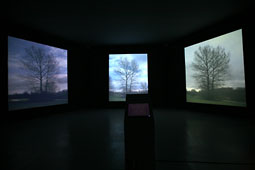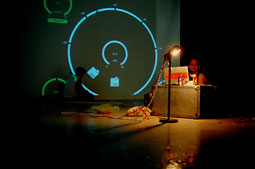| Tree
Studies
2006, A three screen, digital media installation |
||||
  |
||||
| This Installation is an ‘expanded’ version of “Trees
in Winter” and was developed specifically for exhibition
in the 2006 Gwangju Biennale in South Korea. The description was
written for that specific location and attempts to draw parallels
between western science and the Buddhist cosmologies of Asia.
Combining the speed and versatility of modern technology with the strength and spiritual significance of the tree, the installation suggests an environmental model where technology can work collaboratively with natural forces. The combinations of imagery and sound generated in real time is unique at any given moment and is part of a continuously evolving process fueled by the operating system’s interaction with the planetary weather system. In the sciences, this generation of image and sound is often described as an “emergent” property. “Emergence” is a term used to describe self-organization in all living systems and on a planetary scale this is recognized as the dynamic origin of biological life, cognition and evolution. The weather systems which track across the surface of the planet are likewise described as emergent and are the driving force which fuels all biological life and an integral part of the cosmologies of both the ancient and modern world. The ‘shape’ of the work, at any particular moment in time, will be governed by the weather systems, which are constantly circling the planet. Just like the trees in the landscape, the representation will change its form and appearance in response to input from the weather. The flickering ephemeral nature of the projected image will combine with the changing winter light to create an uneasy equilibrium between the power and presence of the tree, the transitory nature of the light and the clouds, and human presence in the landscape. The over all feeling of the work will reflect the vulnerability and transitory nature of all living systems. Drawing on the ancient concept of the earth as a living system, combining the traditional Eastern concept of Yin and Yang and the systems theory from contemporary science the work will suggest a new post Romantic form of landscape art with relevance to the issues of our own times. The installation will use modern high speed communication systems combined with customized soft ware and computer technologies to harness the energy produced by the rotation and tilt of the planet and transform that energy into an open, self regulating and interconnected system. The system will monitor weather data from four different continents, Australia, Europe, North America and Asia, and use this real-time information to edit three files of pre recorded movie footage of a tree seen against the background of a stormy winter sky. Chris Welsby — June 2006 |
||||
| Video Documentation (4.2 mb) | ||||
| Acknowledgements
and Credits Financial assistance: Simon Fraser University, British Columbia Arts Council. Science and Humanities Research Council, Canada. Sound Composition: Mark Brady and Chris Welsby. Software Programming: Mark Brady Thanks to: Binghui Huangfu, curator. Slade School of Fine Art, UCL London, UK. University of Technology – Creativity and Cognition Studios, Sydney, Australia. University of British Colombia – ICICS (Institute for Computing, Information, and Cognitive Systems) Vancouver, Canada. Special Thanks: Mike Leggett, Susan Collins, Kim Lear, Mark Brady. |
||||
|
|